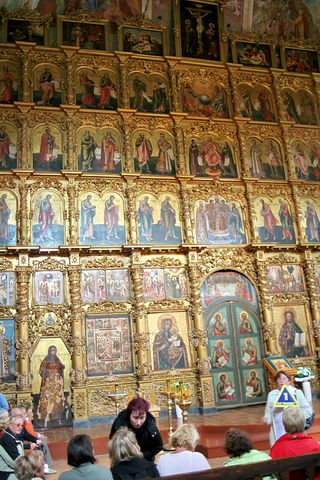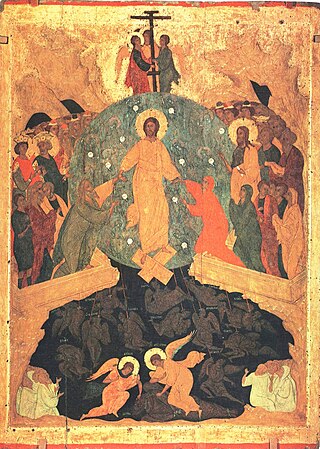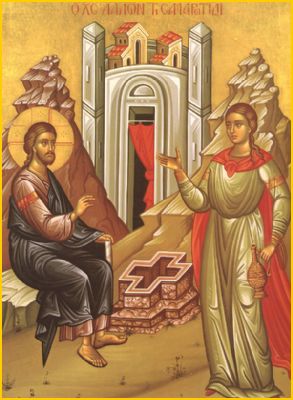
Quinquagesima, in the Western Christian Churches, is the last pre-Lent Sunday, being the Sunday before Ash Wednesday, and the first day of Carnival or Shrovetide. It is also called Quinquagesima Sunday, Quinquagesimae, Estomihi, Shrove Sunday, Pork Sunday, or the Sunday next before Lent.

Great Lent, or the Great Fast, is the most important fasting season of the church year within many denominations of Eastern Christianity. It is intended to prepare Christians for the greatest feast of the church year, Pascha (Easter).

The liturgical year, also called the church year, Christian year or kalendar, consists of the cycle of liturgical seasons in Christian churches that determines when feast days, including celebrations of saints, are to be observed, and which portions of Scripture are to be read either in an annual cycle or in a cycle of several years.

Holy Week is the most sacred week in the liturgical year in Christianity. For all Christian traditions, it is a moveable observance. In Eastern Christianity, which also calls it Great Week, it is the week following Great Lent and Lazarus Saturday, starting on the evening of Palm Sunday and concluding on the evening of Great Saturday. In Western Christianity, Holy Week is the sixth and last week of Lent, beginning with Palm Sunday and concluding on Holy Saturday.

Septuagesima is the name for the ninth Sunday before Easter, the third before Ash Wednesday. The term is sometimes applied to the seventy days starting on Septuagesima Sunday and ending on the Saturday after Easter. Alternatively, the term is sometimes applied also to the period sometimes called pre-Lent that begins on this day and ends on Shrove Tuesday, the day before Ash Wednesday, when Lent begins.

The Byzantine Rite, also known as the Greek Rite or the Rite of Constantinople, is a liturgical rite that is identified with the wide range of cultural, devotional, and canonical practices that developed in the Eastern Christian church of Constantinople.
The Paschal cycle, in Eastern Orthodox Christianity, is the cycle of the moveable feasts built around Pascha (Easter). The cycle consists of approximately ten weeks before and seven weeks after Pascha. The ten weeks before Pascha are known as the period of the Triodion, referring to the liturgical book that contains the services for this liturgical season. This period includes the three weeks preceding Great Lent, the "pre-Lenten period", the forty days of Lent, and Holy Week. The 50 days following Pascha are called the Pentecostarion, also named after the liturgical book.

The Epiphany season, also known as Epiphanytide or the time of Sundays after Epiphany, is a liturgical period, celebrated by many Christian Churches, which immediately follows the Christmas season. It begins on Epiphany Day, and ends at various points as defined by those denominations. The typical liturgical color for the day of Epiphany is white, and the typical color for Epiphany season is green.

Pre-Lent begins the Christian time of preparation for Easter, in the three weeks before Lent. This period launches a campaign of catechesis, reflected in the liturgical readings. Its best-known feature is its concluding three-day festival, Carnival or Shrovetide.

Easter Saturday, on the Christian calendar, is the Saturday following the festival of Easter, the Saturday of Easter or Bright Week. In the liturgy of Western Christianity it is the last day of Easter Week, sometimes referred to as the Saturday of Easter Week or Saturday in Easter Week. In the liturgy of Eastern Christianity it is the last day of Bright Week, and called Bright Saturday, The Bright and Holy Septave Saturday of Easter Eve, or The Bright and Holy Septave Paschal Artos and Octoechoes Saturday of Iscariot's Byzantine Easter Eve. Easter Saturday is the day preceding the Second Sunday of Easter.

Shrove Monday is part of the Carnival or Shrovetide celebrations of the week before Lent, following Quinquagesima or Shrove Sunday and preceding Shrove Tuesday or Mardi Gras.
In Christianity, the Nativity Fast—or Fast of the Prophets in Ethiopian Orthodox Tewahedo Church and Eritrean Orthodox Tewahedo Church—is a period of abstinence and penance practiced by the Eastern Orthodox Church, Oriental Orthodox Church and Catholic Church in preparation for the Nativity of Jesus on December 25. Ethiopian and Eritrean Orthodox Churches commence the season on November 24 and end the season on the day of Ethiopian Christmas, which falls on January 7. The corresponding Western season of preparation for Christmas, which also has been called the Nativity Fast and St. Martin's Lent, has taken the name of Advent. The Eastern fast runs for 40 days instead of four or six weeks and thematically focuses on proclamation and glorification of the Incarnation of God, whereas the Western Advent focuses on three comings of Jesus Christ: his birth, reception of his grace by the faithful, and his Second Coming or Parousia.

Maslenitsa, also known as Butter Lady, Butter Week, Crepe week, or Cheesefare Week, is an Eastern Slavic religious and folk holiday which has retained a number of elements of Slavic mythology in its ritual. It is celebrated during the last week before Great Lent; that is, the eighth week before Eastern Orthodox Pascha.
The Apostles' Fast, also called the Fast of the Holy Apostles, the Fast of Peter and Paul, or sometimes St. Peter's Fast, is a fast observed by Eastern Orthodox, Oriental Orthodox, Eastern Catholic, and Reformed Orthodox Christians. In the Byzantine tradition, the Fast begins on the second Monday after Pentecost, whereas in the Coptic and old Syriac traditions, the Fast begins on the first Monday after Pentecost.

The Copts, who belong mostly to the Coptic Orthodox Church, observe fasting periods according to the Coptic calendar. In Coptic Orthodox Christianity, fasting is defined as going without water and food from midnight to sunset; after that time, the consumption of water and one vegetarian meal is permitted. The fasting periods of Coptic Christians are exceeded by no other Christian denomination except the Orthodox Tewahedo. Out of the 365 days of the year, Copts often fast between 210 and 240 days. This means that Copts abstain from all animal products for up to two-thirds of each year. Coptic Orthodox fasts have evolved over time to become more lengthy and severe. A lifestyle involving such fasts may have contributed to the pacifist mindset of the Coptic people for centuries. Married couples refrain from sexual relations during Lent "to give themselves time for fasting and prayer".

The Gospel in Christian liturgy refers to a reading from the Gospels used during various religious services, including Mass or Divine Liturgy (Eucharist). In many Christian churches, all present stand when a passage from one of the Gospels is read publicly, and sit when a passage from a different part of the Bible is read. The reading of the Gospels, often contained in a liturgical edition containing only the four Gospels, is traditionally done by a minister, priest or deacon, and in many traditions the Gospel Book is brought into the midst of the congregation to be read.

The Pentecostarion is the liturgical book used by the Eastern Orthodox and Byzantine Catholic churches during the Paschal Season which extends from Pascha (Easter) to the Sunday following All Saints Sunday.

Lent is the solemn Christian religious observance in the liturgical year commemorating the 40 days Jesus Christ spent fasting in the desert and enduring temptation by Satan, according to the Gospels of Matthew, Mark and Luke, before beginning his public ministry. Lent is usually observed in the Catholic, Lutheran, Moravian, Anglican, United Protestant and Orthodox Christian traditions, among others. Some Anabaptist, Baptist, Methodist, Reformed, and nondenominational Christian churches also observe Lent, although many churches in these traditions do not.
Fasting is practiced in various religions. Examples include Lent in Christianity and Yom Kippur, Tisha B'av, Fast of Esther, Fast of Gedalia, the Seventeenth of Tammuz, and the Tenth of Tevet in Judaism. Muslims fast during the month of Ramadan each year. The fast includes refraining from consuming any food or liquid from sunup until sundown.
















